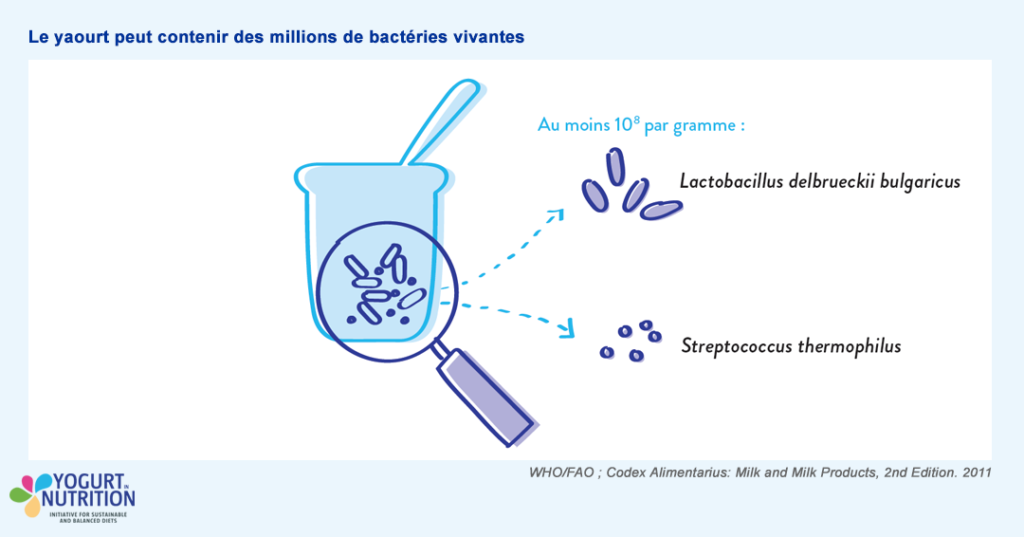La consommation régulière de yaourt entraîne une modification de la composition et du fonctionnement du microbiote intestinal, ce qui peut avoir des effets bénéfiques pour la santé.
L’alimentation peut avoir une influence sur la diversité du microbiote intestinal, qui est importante pour la santé
Le microbiote intestinal joue un rôle important dans la digestion. Il serait également essentiel au bon
développement et fonctionnement des systèmes immunitaire et nerveux.
Des chercheurs ont émis l’hypothèse selon laquelle il existerait un « profil » de microbiote intestinal qui
favoriserait l’inflammation dans les intestins et, par conséquent, une inflammation systémique de faible
intensité, elle-même associée à une prédisposition au diabète de type 2 (DT2) et à l’obésité.
Le maintien de la diversité du microbiote intestinal est important pour prévenir les maladies.
« En tant qu’aliment fermenté contenant des millions de bactéries vivantes, le yaourt peut avoir un effet bénéfique sur la santé des intestins, en enrichissant et en renforçant le microbiote intestinal, en protégeant la barrière muqueuse intestinale et en prévenant un certain nombre de troubles gastro-intestinaux. »
La composition du microbiote intestinal est influencée par notre alimentation, entre autres facteurs. De plus, dans les aliments fermentés, dont le yaourt, les produits de la fermentation, notamment les bactéries impliquées dans le processus de fermentation, peuvent conférer des propriétés supplémentaires aux aliments, au-delà de leurs apports nutritionnels de base.
Par conséquent, les aliments fermentés tels que le yaourt éveillent la curiosité des chercheurs, car ils
pourraient avoir des effets bénéfiques autres qu’une longue durée de conservation ou une texture et un
goût meilleurs.
Le yaourt peut apporter des millions de bactéries vivantes jusqu’aux intestins et entraîner une modification bénéfique du microbiote intestinal
Le yaourt à base de cultures vivantes contient des millions de bactéries et manger du yaourt tous les jours
pourrait permettre de multiplier par 10 000 le nombre de bactéries dans l’alimentation.
Il semblerait que la consommation quotidienne de yaourt renforce la quantité de Lactobacilli dans les intestins et soit associée à une légère augmentation de la diversité microbienne pendant une période de 42 jours.
En plus de modifier la composition du microbiote intestinal de façon bénéfique, les bactéries probiotiques (des microorganismes vivants dont la consommation est censée être bénéfique pour la santé) présentes dans le yaourt modifieraient également le fonctionnement des bactéries intestinales existantes en exerçant une influence sur la production d’AGCC. Or, les AGCC ont des effets bénéfiques sur le métabolisme énergétique.
Alors que les bactéries probiotiques sont peu susceptibles d’avoir des effets durables sur le microbiote
intestinal81, la consommation régulière de yaourt à base de cultures vivantes permet de renforcer, au moins temporairement, les bactéries vivantes dans l’intestin, le plus souvent les ferments du yaourt Streptococcus thermophilus et Bifidobacterium animalis subsp. lactis.
De plus, des prébiotiques peuvent être ajoutés au yaourt (souvent sous forme de fruits), ce qui peut stimuler la prolifération des bonnes bactéries dans l’intestin.
Le yaourt aiderait à protéger la barrière muqueuse intestinale
Des études menées chez l’animal ont suggéré qu’un peptide dérivé de la protéine du lait présente dans le yaourt, la caséine β, augmenterait la production de mucine, un composant essentiel de la muqueuse qui tapisse la paroi intestinale et la protège.
« La régulation du microbiote intestinal grâce à la consommation de yaourt pourrait aider à traiter et à prévenir le syndrome de l’intestin irritable, la diarrhée infectieuse et la gastro-entérite allergique. Des études doivent être menées afin de mieux connaître ces bienfaits potentiels. »
Le yaourt protégerait contre les maladies gastro-intestinales
Les recherches menées suggèrent que le yaourt jouerait un rôle dans la prévention et le traitement des troubles gastro-intestinaux.
Le yaourt est fréquemment utilisé dans de nombreux pays dans le cadre de la prise en charge nutritionnelle de la gastro-entérite aiguë. Toutefois, nous disposons de peu de données sur cette stratégie thérapeutique et il faudrait mener des essais contrôlés et randomisés sur de vastes échantillons afin de confirmer le bien-fondé de cette stratégie.
En cas de diarrhée persistante légère à modérée chez l’enfant, un régime à base de yaourt peut être conseillé, car il est prouvé que la consommation de yaourt permet de réduire la production de selles et la durée de la diarrhée.
L’effet régulateur du yaourt sur le microbiote intestinal, en particulier du yaourt contenant les bactéries
Lactobacillus et Bifidobacterium, pourrait être intéressant pour prévenir ou traiter des maladies gastro-intestinales telles que le syndrome de l’intestin irritable, la diarrhée infectieuse et la gastro-entérite allergique.
« Le yaourt est un élément important des recommandations nutritionnelles et alimentaires car il apporte à la fois une forte densité nutritionnelle et des bactéries vivantes qui favorisent une bonne santé intestinale. »
References:
- World Health Organization; Food and Agriculture Organization of the United Nations. Codex Alimentarius: Milk and Milk Products, Second Edition. 2011.
- Le Roy CI, Kurilshikov A, Leeming ER, et al. Yoghurt consumption is associated with changes in the composition of the human gut microbiome and metabolome. BMC Microbiology. 2022;22:39.
- Fernandez MA, Marette A. Potential health benefits of combining yogurt and fruits based on their probiotic and prebiotic properties. Adv Nutr. 2017;8:155S–64S.
- Savaiano DA, Hutkins RW. Yogurt, cultured fermented milk, and health: a systematic review. Nutr Rev. 2021;79:599–614
- Lisko DJ, Johnston GP, Johnston CG. Effects of dietary yogurt on the healthy human gastrointestinal (GI) microbiome. Microorganisms. 2017;5:6.
- de Mattos AP, Ribeiro TC, Mendes PS, et al. Comparison of yogurt, soybean, casein, and amino acid-based diets in children with persistent diarrhea. Nutr Res. 2009;29:462–9.
- Goulet O. Potential role of the intestinal microbiota in programming health and disease. Nutr Rev. 2015;73(Suppl 1):32–40.
- Barengolts E. Gut microbiota, prebiotics, probiotics, and synbiotics in management of obesity and prediabetes: review of randomized controlled trials. Endocr Pract. 2016;22:1224–34.
- Marco ML, Heeney D, Binda S, et al. Health benefits of fermented foods: microbiota and beyond. Curr Opin Biotechnol. 2017;44:94–102.
- Wen L, Duffy A. Factors influencing the gut microbiota, inflammation, and type 2 diabetes. J Nutr. 2017;147:1468S–75S.
- Hill D, Sugrue I, Arendt E, et al. Recent advances in microbial fermentation for dairy and health. F1000Res. 2017;6:751.
- Redondo-Useros N, Gheorghe A, Diaz-Prieto LE, et al. Associations of probiotic fermented milk (PFM) and yogurt consumption with Bifidobacterium and Lactobacillus components of the gut microbiota in healthy adults. Nutrients. 2019;11:651
- Gonzalez S, Fernandez-Navarro T, Arboleya S, et al. Fermented dairy foods: impact on intestinal microbiota and healthlinked biomarkers. Front Microbiol. 2019;10:1046.
- Pasolli E, De Filippis F, Mauriello IE, et al. Large-scale genome-wide analysis links lactic acid bacteria from food with the gut microbiome. Nature Comm. 2020;11:2610.
- Ghiamati Yazdi F, Barner Dalgaard L, Li Q, et al. Long-term daily high-protein, drained yogurt consumption alters abundance of selected functional groups of the human gut microbiota and fecal short-chain fatty acid profiles in a cohort of overweight and obese women. J Functional Foods. 2022;93:105089.
- Chen Y, Feng R, Yang X, et al. Yogurt improves insulin resistance and liver fat in obese women with nonalcoholic fatty liver disease and metabolic syndrome: a randomized controlled trial. Am J Clin Nutr. 2019;109:1611–9.
- den Besten G, van Eunen K, Groen AK, et al. The role of short-chain fatty acids in the interplay between diet, gut microbiota, and host energy metabolism. J Lipid Res. 2013;54:2325–40.
- Plaisancié P, Claustre J, Estienne M, et al. A novel bioactive peptide from yoghurts modulates expression of the gelforming MUC2 mucin as well as population of goblet cells and Paneth cells along the small intestine. J Nutr Biochem. 2013;24:213–21.
- Plaisancié P, Boutrou R, Estienne M, et al. β-Casein(94–123)-derived peptides differently modulate production of mucins in intestinal goblet cells. J Dairy Res. 2015;82:36–46.
- Donovan SM, Rao G. Health benefits of yogurt among infants and toddlers aged 4 to 24 months: a systematic review. Nutr Rev. 2019;77:478–86.
- Patro-Gołąb B, Shamir R, Szajewska H. Yogurt for treating acute gastroenteritis in children: systematic review and metaanalysis. Clin Nutr. 2015;34:818–24.





